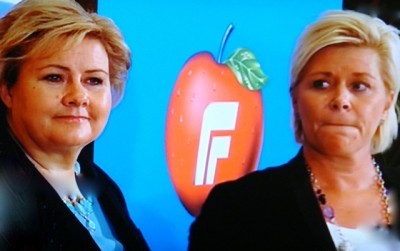Prime Minister Erna Solberg has claimed that this week’s earthquake of an election only affected and reflected local politics, and had no bearing on her government coalition. She denied her coalition parties’ losses amounted to a voters’ verdict over her government at mid-term, but commentators disagreed and, at the very least, Solberg may see a need to shake up her roster of government ministers.

When the final votes were tallied to elect local governments in Norway for the next four years, Solberg’s Conservative Party ended up winning just 23.2 percent on a nationwide basis, down 4.7 percentage points from the voting in 2011. Her coalition partner, the Progress Party, won just 9.5 percent, down 1.7 points. Arch-rival Labour, meanwhile, won 33.1 percent of the vote, up 1.3 points and other left-wing parties gained as well.
The results have vast ramifications, with Labour already embarking on building new alliances (with the Christian Democrats in Bergen, for example, and the Greens Party in Oslo). The breakthrough made by the Greens gives them the swing vote in many local communities, with the power that goes along with that, even though they still hold an average 4.2 percent of the overall vote. In Oslo, they’ve already become a potent force, and are accepting an invitation from Labour to talk about forming a new government.
Worrisome losses
For Solberg, the Progress Party’s huge losses and internal discontent are at least as worrisome as those suffered by her own party. Progress Party members are already debating whether they should continue in government, with some claiming that the compromises government participation forces them to make are costing them too many voters.
If Solberg loses the Progress Party, her coalition will crumble, so she was busy stressing all the accomplishments her partner has made while in government. “Just look at (Transport Minister) Ketil Solvik-Olsen when he smiles and talks abut railway- and road-building,” Solberg told newspaper Aftenposten, referring to one of the Progress Party’s most popular ministers. “Or Justice Minister Anders Anundsen, who boasts in his own film about his results. They’re both proud!”
Solberg clearly wants the Progress Party to stick with her, and maintains that Monday’s election results “aren’t any judgment of the government cooperation … because local results run in all directions. We had strong gains in some communities, big losses in others.” The issues were local, although national politicians played a big role in the election campaign.
Solberg likes being in government and thinks the Progress Party does, too. She thinks the party has prevailed not only with its transport policies but also in crime-fighting measures, elder care and tax relief. “I think they’ll see that they have gotten a lot out of being part of government, but it’s their choice,” Solberg told Aftenposten.
Cabinet can be reshuffled
Meanwhile, speculation was flying that election results would prompt Solberg to make some ministerial changes within her cabinet. Several media outlets predicted that the Conservatives’ unpopular minister for culture, Thorild Widvey, would be replaced by Fabian Stang, the Conservatives’ highly popular politician who’s likely on his way out as mayor of Oslo. He expressed surprise at the prospect: “Oh no, no … that’s something I haven’t thought about at all or have any impression about,” Stang told newspaper Dagens Næringsliv (DN) on Wednesday. Asked what he would answer if Solberg called upon his services in her government, he said he didn’t think that would happen “but I have never said ‘no’ to Erna.”
DN reported that Solberg may tap other popular mayors from government parties for ministerial posts, for example Terje Søviknes, one of the few Progress Party mayors (of Os, near Bergen) who survived Monday’s voter revolt. Conservative minister Elisabeth Aspaker (fisheries) may be sacrificed, along with the Progress Party’s Labour Minister Robert Eriksson, with the Conservatives’ Education Minister Torbjørn Røe Isaksen a hot candidate to take over for Eriksson.
Solberg predictably denies any ministerial changes are in the works. “A government sits as long as it sits, and ministers must be prepared to resign at any time,” she allowed. “But there are no plans for changes at the moment,” she told Aftenposten.
There were some areas where the Conservatives could seek comfort after the elections. Their local results remained up in the 20+ percent range on a national basis and in Oslo, there were several neighbourhoods (mostly in the affluent western portions of the city) where more than 60 percent of the voters cast ballots in their favour. Newspaper Dagsavisen reported that the Conservatives also won 35.5 percent of the vote in the east-side neighbourhood of Østensjø.
newsinenglish.no/Nina Berglund

